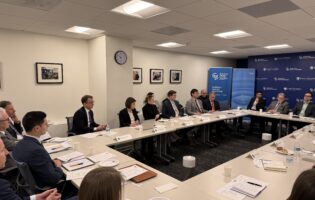The Future of Global Governance
China’s increasing political and economic presence in the world has emerged as a key issue in transatlantic relations. While the United States is reacting cautiously to this growing influence, its European allies are actively seeking to establish closer ties with China. AGI’s workshop “Transatlantic Cooperation toward China and the Future of Global Governance” on April 15 brought together a group of experts from Germany, the United States, and China to discuss the issues most pressing to relations between these three countries.
Panel I: International Order and a Rising China
The first panel dealt with the ongoing re-distribution of global powers, German and American interests with regard to China, and their respective perception of China’s role in the international system.
U.S.-China Relations
The U.S. and China maintain a very delicate and dynamic relationship, as the world enters a new era with a changing distribution of economic power and influence. The question is: how do we adjust to this new balance of power? One way is to change the old distribution of voting shares within existing international organizations such as the International Monetary Fund (IMF). China has become increasingly frustrated with the unwillingness of Western countries to adjust the distribution of power in the organization in line with its rising economic weight. The United States and its partners at the IMF agreed in 2010 to give emerging nations an expanded role in the institution, but the U.S. Congress has so far refused to ratify the decision.
The United States plays an important security role in the Asia-Pacific region and maintains five security alliances. Nevertheless, China is changing the security dynamics in Southeast Asia. China’s growing military presence in this region has alarmed the U.S. From the U.S. point of view, Europeans are not willing enough to get involved in terms of security policy in the region.
Sino-German Relations
China is seen by Germany as a key actor in the international system and as a core strategic partner. Germany engages with China in a myriad of dialogues bilaterally via government consultations and in multilateral fora on global challenges. As a big export competitor, China is seen as a threat, but it is also seen as an opportunity.
The German approach toward China strives for influence through soft power and mostly through provision of expertise and cooperation. China and Germany share interests in a whole host of areas such as trade, cultural exchanges, language and science cooperation, climate change, and global governance. Germany is conducting an approach of active involvement and integration toward China, exemplified by numerous dialogue platforms and common initiatives (Sino-German High-Level Financial Dialogue, Rule of Law Dialogue, Human Rights Dialogue, Dialogue on Foreign Security Policy, Sino-German comprehensive strategic partnership in global responsibility). Germany also decided to join the China-backed Asian Infrastructure Investment Bank (AIIB) as a founding member.
It seems that Germany and the U.S. share interests vis-à-vis China and in keeping the current international order, but do not have a joint vision or approach.
Jiang Shixue Presentation May-Britt Stumbaum Presentation
Panel II: Global Economic Governance
International Organizations
Recent developments with the Asian Infrastructure Investment Bank (AIIB) and the U.S. Congress’ refusal to pass IMF voting reform are impacting relations between the three countries and elicit questions about the current IMF structure with regard to China’s place in the international system.
In the context of both the AIIB and the IMF reform quota, there are three focal points when talking about global economic governance:
- Global imbalances,
- Exchange rates, and,
- Fiscal and structural imbalances.
Where does the AIIB fit in the larger international system? There are a number of economic motives behind the AIIB, including the use of the bank as a means of funding infrastructure investment projects, the opening up of financial markets in Asia, and an alternative institution to counter Western dominance in existing international institutions. The AIIB acts as a stimulator of international reform of the Bretton Woods institutions.
In the current IMF structure, China ranks sixth in voting, with only 4 percent of the total voting rights, despite the economic growth it has achieved in recent decades. As the world’s largest saver and exporter of capital, China is experimenting with different forms of leadership. However, without reforming representational rights, the influence of existing international organizations will be weakened. The risk is that the international system will move toward regional competition or institutional competition.
Please contact Kimberly Frank at kfrank@aicgs.org with any questions.
[flickr set=”72157651946454868″]
Location
SAIS Rome Building
1619 Massachusetts Avenue, NW Rome Auditorium Washington, DC 20036







